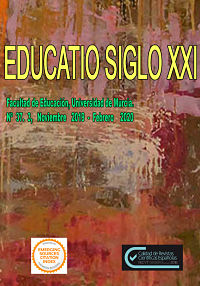School culture within the Spanish Second Republic. Legislation and pedagogical theory and practice
Abstract
This study examines the presence of pedagogical norms and pedagogical theory in primary school practice during the time of the Second Republic through the analysis, according to the historical-pedagogical method, of manifold documentary sources: Teaching practice journals of teacher trainees, primary school minute books, legislative notices and school notebooks. Our results show the systematic and direct implementation of the norms and the pedagogical theory in schools, highlighting the joint action of both spheres in daily
school practice. This evidences the degree of involvement of a significant number of teachers with the aims and principles of the Republican government, together with the fact that the government itself used schools as a platform to achieve their aims and ideals.
Downloads
-
Abstract1606
-
PDF (Español (España))892
References
Barceló, G., Comás, F. y Sureda, B. (2016). Abriendo la caja negra: la escuela pública española de posguerra. Revista de Educación, (371), pp.61-82.
Beas, M. y González, E. (2016). Estudio de las emociones en las consignas de cuadernos españoles. Curso 1964-1965. Revista de Estudios Sociales de la Universidad de los Andes, (58), pp. 52-62
Barreiro, H. (1983).Repercusiones de la revolución ideológica y científica del último tercio del siglo XIX en las innovaciones educativas de la Institución Libre de Enseñanza. Revista de Historia de la Educación. Revista Interuniversitaria, (2), pp. 209-215.
Capitán, A. (1986). Historia del pensamiento pedagógico en Europa. Madrid: Dykinson. Vol. II.
Cossío, M.B. (1929). De su jornada. Madrid: Imprenta de Blas.
Escolano, A. (2006). La cultura de la escuela en el sistema educativo liberal. En A. Escolano. (Dir.). Historia ilustrada de la escuela en España. Dos siglos de perspectiva histórica. (pp. 23-46). Madrid: Fundación Germán Sánchez Ruipérez.
Escolano, A. (2007). La cultura material de la escuela. En A. Escolano (ed.). La cultura material de la escuela. En el centenario de la JAE,(1907-2007). (pp.15-27). Berlanga de Duero: CEINCE.
Fraile, B. y Ramos Ruiz, I. (2014). Una nueva manera de interpretar los cuadernos escolares: Las escrituras al margen. History of Education & Children Literature, Macerata, IX, (2), pp.643-66
Fraile, B. y Ramos Ruiz, I. (2015). La historia contada en los cuadernos escolares. Madrid: Catarata.
Juliá, D. (1995). La cultura scolaire comme objet historique. The colonial experience in education. Paedagogica Historica Supl. Series, (1), pp. 353-382.
Llopis, R. (1927). Hacia una escuela más humana. BILE, marzo.
Martín, B. (2015). La cultura escolar y el oficio de maestro. Educación XXI. UNED, 18 (1), pp. 147-166.
Martín, B. y Ramos, I. (2010). Segunda República y escuela. Valores sociales y cívicos en los cuadernos de rotación. En E. Collellldemont (coord.). Memoria, ciudadanía y museos de educación. (pp.171-181). IV Jornadas de la SEPHE. Vic: MUVIP.
Molero, A. (2010). La inspección educativa y el perfeccionamiento del profesorado: una visión retrospectiva. Participación Educativa, (13), pp.170-179.
Pozo, Mª M. del y Rabazas,T. (2013). Políticas educativas y prácticas escolares: la aplicación de la Ley de Enseñanza primaria de 1945 en las aulas. Bordón, (65), 4, pp. 119-133.
Revista de Pedagogía (1922-1936). Madrid: La Revista
Sustar, B. (2011). What was school like? Testimonies on schooling as part of collector, exhibition, research and publicist activity of the museum. En AM. Augschöll, (coord.). XIV International Symposium for School Life and School History Collections, Freue Universität Bozen, Brixen.
Viñao, A. (1996). Por una historia de la cultura escrita: observaciones y reflexiones. Signo. Revista de Historia de la Cultura Escrita, (3), pp. 41-68.
Original work publishes in this journal is subject to the following terms:
1. Murcia University Press (the publishing house) holds the copyright of the publishes work, and favours and allows their reutilization under the use license stated in point 2.
© Servicio de Publicaciones, Universidad de Murcia, 2015
2. Work is published in the electronic edition under a license (Creative Commons Reconocimiento-NoComercial-SinObraDerivada 4.0 España (legal text). They can be copied, used, disseminated, transmitted and publicly presented, as long as: i) authorship and original publication source is acknowledged (journal, publishing house and URL of the work); ii) are not used for commercial purposes; iii) the existence and specifications of this use license is stated.
3. Conditions for self-archive. Authors are allowed and encouraged to disseminate electronically the pre-pint (before review) and/or post-print (accepted for publication) versions of their work before their publication since that favours earlier circulation and dissemination resulting in an increased chance for the authors to be cited and for the work to reach a bigger share of the academic community. Colour: RoMEO: green.







